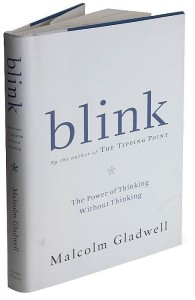 This article was originally published a few years ago at the RockStar Success Library. But it’s still as relevant as it was then. Don’t make too quick a judgement 😉
This article was originally published a few years ago at the RockStar Success Library. But it’s still as relevant as it was then. Don’t make too quick a judgement 😉
In Blink, Malcolm Gladwell goes from his examination of macroscopic communication in The Tipping Point to the other end of the spectrum. With Blink, Malcolm looks at the power of first impressions. And more importantly, he examines how our minds create these first impressions and why they have so much power over us.
One of the main concepts that Malcolm looks at is the idea of thin slicing. This is how he describes that act of making decisions based on a a small amount (or a thin slice) of information. It’s how our mind creates first impressions when we first meet someone, or when we are in a new situation. “Thin-slicing refers to the ability of our unconscious to find patterns in situations and behaviors based on very narrow slices of experience.” (p. 23)
For the rest of the book he looks at how this ability to “thin-slice” works in our life. He examines both the reasons that it functions as well as it does, and the areas where this ability to quickly come to conclusions can fail. He makes the point, especially in his chapter “The Locked Door”, that in many ways we have two minds working at the same time – our conscious and our unconscious. Often, they can come to different conclusions, and it’s not a given that one is always correct.
Ideas, Implications, and Questions:
- Blink points out the power of our unconscious mind to both take in and process a lot more information than our conscious mind and do it more quickly. In many ways, this is supports that idea of “hunches” or “gut feelings” about people and events. I think often our “gut” is our body communicating what our unconscious has already figured out.
- This also reinforces the need to be aware of how you are perceived by others. We’d like to think that first impressions can be overcome rather easily, but it’s more likely that changing a first impression is an uphill battle. If that’s the case, it makes sense to create the most favorable impression possible.
- The flip side is the need for us to be aware that our first impressions can indeed be wrong. Malcolm calls the “Warren Harding error” the “dark side of rapid cognition… We have to acknowledge and understand those circumstances when rapid cognition leads us astray.” (p. 76). This can encourage us to be open to the fact that our initial response to someone might not be accurate.
- There is a paradox to keep in mind here – that with these two minds, the conscious and unconscious, there isn’t a guarantee that one is always right and one wrong. By looking at these as tools, and understanding how we process this information, we can make better decisions. This is, for me, the crux of the message.
- Why I’m always skeptical of movie (or any) reviews: “The first impressions of experts are different.” (p. 179) “whenever we have something that we are good at – something we care about – that experience and passion fundamentally change the nature of our first impressions. That does not mean that when we are outside our areas of passion and experience our reactions are invariably wrong. It just means that they are shallow.” (p. 184). So be careful when listening to experts.
Should you read this book?:
It’s a fun read. Like The Tipping Point, it’s a good chance to learn about the workings of the world around us, and in this case, within us.
